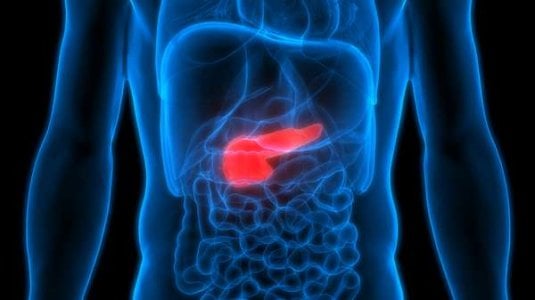New drug offers pancreatic cancer patients a fighting chance
- Replies 0
Pancreatic cancer has long been a formidable foe in the medical community, often eluding early detection and resisting conventional treatments.
However, hope is on the horizon for those affected by what is known as one of the world's deadliest cancers.
A groundbreaking lab study has revealed a new drug that has the potential to significantly shrink pancreatic tumours, offering a glimmer of optimism for patients and their families.
The experimental drug, identified as RMC-7977, showed remarkable efficacy in preclinical trials, reducing the size of pancreatic tumours by an astonishing 30 to 98 per cent.
This breakthrough could herald a new era in the fight against pancreatic cancer, which claims the lives of tens of thousands each year, including notable figures such as Supreme Court Justice Ruth Bader Ginsburg, actor Richard Roundtree, TV presenter Jerry Springer, and Apple's visionary CEO Steve Jobs.

Pancreatic cancer is notorious for its aggressive nature and poor prognosis.
With around 4,506 new cases diagnosed in Australia in 2023, which is two per cent of all the new cases diagnosed for the year, the survival rate after five years is a dismal 13 per cent or less.
The current arsenal of surgery, chemotherapy, and immunotherapy has been largely unsuccessful, particularly because the cancer is typically diagnosed at advanced stages.
The new drug targets a gene called KRAS (pronounced ‘kay-ras’ and stands for Kirsten Rat Sarcoma viral oncogene homolog), which plays a pivotal role in cell division and death.
When mutated, KRAS can lead to uncontrolled cell growth, a hallmark of cancer.
Dr Kenneth Olive, the physician at Columbia University who led the research, expressed unprecedented optimism about the drug's potential.
‘For over four decades, we have known that there’s one particular RAS protein, called KRAS, that’s mutated and drives about 95 per cent of all pancreatic ductal adenocarcinoma cases, and we’ve had no direct tools to attack it for most of that time,’ Dr Olive explained.
The mutated gene aids in converting healthy pancreatic cells into malignant ones, fostering the development of tumours resistant to conventional treatment methods like chemotherapy.
The scientists evaluated the medication using cancerous cells obtained from human subjects, observing tumour reduction in seven of the ten models.
The degree of shrinkage varied, ranging from 30 percent to 98 percent compared to the initial volume of the tumours.
‘RMC-7977, as a single agent, outperformed the best combination regimen that has ever been reported in the literature in that model system,’ Dr Olive declared, adding that it marked the initial instance where tumours consistently diminished in size across all models.
They also discovered that the treatment didn't cause harm to surrounding healthy cells, unlike several cancer treatments such as chemotherapy and radiation, which can damage healthy cells along with targeting cancerous ones.
‘I’ve been working on pancreatic cancer for almost 20 years, and I’ve never seen preclinical results like these,’ Dr Olive continued.
‘I think there is a real chance this approach will help change the standard of care for pancreatic cancer patients, but only clinical trials can determine that.’
The symptoms of pancreatic cancer, including decreased appetite, stomach pain, weight loss, jaundice, and fatigue, often don't manifest until the disease is advanced—making awareness and early detection crucial.
A survey by the Pancreatic Cancer Action Network found that a staggering 83 per cent of adults are unaware of the disease's signs.
Risk factors include smoking, type 2 diabetes, obesity, old age, excessive alcohol consumption, and certain genetic predispositions.
The groundbreaking research in pancreatic cancer treatment sheds new light on combating one of the deadliest diseases, offering hope to patients and their families.
As medical science continues to make strides in understanding and addressing complex conditions like pancreatic cancer, similar breakthroughs are also transforming the landscape of diabetes treatment.
 Have you or someone you know been touched by pancreatic cancer? Share your experiences and thoughts on this new development in the comments below.
Have you or someone you know been touched by pancreatic cancer? Share your experiences and thoughts on this new development in the comments below.
However, hope is on the horizon for those affected by what is known as one of the world's deadliest cancers.
A groundbreaking lab study has revealed a new drug that has the potential to significantly shrink pancreatic tumours, offering a glimmer of optimism for patients and their families.
The experimental drug, identified as RMC-7977, showed remarkable efficacy in preclinical trials, reducing the size of pancreatic tumours by an astonishing 30 to 98 per cent.
This breakthrough could herald a new era in the fight against pancreatic cancer, which claims the lives of tens of thousands each year, including notable figures such as Supreme Court Justice Ruth Bader Ginsburg, actor Richard Roundtree, TV presenter Jerry Springer, and Apple's visionary CEO Steve Jobs.

RMC-7977 showed promising results by significantly shrinking pancreatic tumours in laboratory studies. Credits: Shutterstock
Pancreatic cancer is notorious for its aggressive nature and poor prognosis.
With around 4,506 new cases diagnosed in Australia in 2023, which is two per cent of all the new cases diagnosed for the year, the survival rate after five years is a dismal 13 per cent or less.
The current arsenal of surgery, chemotherapy, and immunotherapy has been largely unsuccessful, particularly because the cancer is typically diagnosed at advanced stages.
The new drug targets a gene called KRAS (pronounced ‘kay-ras’ and stands for Kirsten Rat Sarcoma viral oncogene homolog), which plays a pivotal role in cell division and death.
When mutated, KRAS can lead to uncontrolled cell growth, a hallmark of cancer.
Dr Kenneth Olive, the physician at Columbia University who led the research, expressed unprecedented optimism about the drug's potential.
‘For over four decades, we have known that there’s one particular RAS protein, called KRAS, that’s mutated and drives about 95 per cent of all pancreatic ductal adenocarcinoma cases, and we’ve had no direct tools to attack it for most of that time,’ Dr Olive explained.
The mutated gene aids in converting healthy pancreatic cells into malignant ones, fostering the development of tumours resistant to conventional treatment methods like chemotherapy.
The scientists evaluated the medication using cancerous cells obtained from human subjects, observing tumour reduction in seven of the ten models.
The degree of shrinkage varied, ranging from 30 percent to 98 percent compared to the initial volume of the tumours.
‘RMC-7977, as a single agent, outperformed the best combination regimen that has ever been reported in the literature in that model system,’ Dr Olive declared, adding that it marked the initial instance where tumours consistently diminished in size across all models.
They also discovered that the treatment didn't cause harm to surrounding healthy cells, unlike several cancer treatments such as chemotherapy and radiation, which can damage healthy cells along with targeting cancerous ones.
‘I’ve been working on pancreatic cancer for almost 20 years, and I’ve never seen preclinical results like these,’ Dr Olive continued.
‘I think there is a real chance this approach will help change the standard of care for pancreatic cancer patients, but only clinical trials can determine that.’
The symptoms of pancreatic cancer, including decreased appetite, stomach pain, weight loss, jaundice, and fatigue, often don't manifest until the disease is advanced—making awareness and early detection crucial.
A survey by the Pancreatic Cancer Action Network found that a staggering 83 per cent of adults are unaware of the disease's signs.
Risk factors include smoking, type 2 diabetes, obesity, old age, excessive alcohol consumption, and certain genetic predispositions.
The groundbreaking research in pancreatic cancer treatment sheds new light on combating one of the deadliest diseases, offering hope to patients and their families.
As medical science continues to make strides in understanding and addressing complex conditions like pancreatic cancer, similar breakthroughs are also transforming the landscape of diabetes treatment.
Key Takeaways
- An experimental drug has shown promising results by significantly shrinking pancreatic tumours in laboratory studies.
- The treatment specifically targets the KRAS gene, which is a common genetic driver in 95 percent of pancreatic ductal adenocarcinomas.
- The novel drug, named RMC-7977, outperformed existing treatment combinations, reducing tumour size in seven out of 10 models with no apparent harm to healthy cells.
- Pancreatic cancer has a very low five-year survival rate and often goes undetected until advanced stages, but these new findings offer hope for more effective treatments and potentially better outcomes for patients.







